
Camp Justice (also known as Camp Al-Adala; Arabic : معسكر العدالة) was a joint Iraqi-U.S. military base [1] in the Kadhimiya district of Baghdad, Iraq.

Camp Justice (also known as Camp Al-Adala; Arabic : معسكر العدالة) was a joint Iraqi-U.S. military base [1] in the Kadhimiya district of Baghdad, Iraq.
The location was renamed from "Camp Banzai" in mid-September 2004 as part of an effort to give Army facilities around Baghdad friendlier names. [2]
Camp Justice was the location of the 2006 execution of Saddam Hussein; the 2007 hanging of Barzan Ibrahim al-Tikriti, Awad Hamed al-Bandar, and Taha Yassin Ramadan; and the 2010 hanging of Saddam's cousin Ali Hassan al-Majid, a.k.a. Chemical Ali.
The former president of Iraq, Saddam Hussein was executed at approximately 05:50 +03:00 UTC on December 30, 2006. Two weeks later on January 15, 2007, Barzan Ibrahim al-Tikriti, former head of the Iraqi Intelligence Service, and Awad Hamed al-Bandar, former head of the Iraqi Revolutionary Court, were also executed by hanging at this site. [3]
Saddam's former deputy and former vice-president, Taha Yassin Ramadan (who was originally sentenced to life in prison on November 5, 2006, but had it changed to a death sentence three months later), was likewise hanged here on March 20, 2007, two months and five days after Barzan's and al-Bandar's execution. Likewise Saddam's cousin Ali Hassan al-Majid (Chemical Ali) was hanged on January 25, 2010 (three years after his cousin's execution), after receiving four death sentences. [3]
Women on Iraq's death row are held at the Shaaba Khamsa death row facility at Camp Justice. As of 2014 the adult women's death row had 36 women as well as children even though the facility was only intended to hold 25 women. [4]
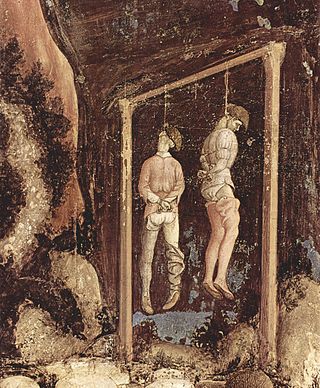
Hanging is killing a person by suspending them from the neck with a noose or ligature. Hanging has been a common method of capital punishment since the Middle Ages, and is the primary execution method in numerous countries and regions. The first known account of execution by hanging is in Homer's Odyssey. Hanging is also a method of suicide.

Iraq under the Arab Socialist Ba'ath Party saw severe violations of human rights. Secret police, state terrorism, torture, mass murder, genocide, ethnic cleansing, rape, deportations, extrajudicial killings, forced disappearances, assassinations, chemical warfare, and the destruction of the Mesopotamian marshes were some of the methods Saddam Hussein and the country's Ba'athist government used to maintain control. Saddam committed crimes of aggression during the Iran–Iraq War and the Gulf War, which violated the Charter of the United Nations. The total number of deaths and disappearances related to repression during this period is unknown, but is estimated to be at least 250,000 to 290,000 according to Human Rights Watch, with the great majority of those occurring as a result of the Anfal genocide in 1988 and the suppression of the uprisings in Iraq in 1991. Human Rights Watch and Amnesty International issued regular reports of widespread imprisonment and torture.
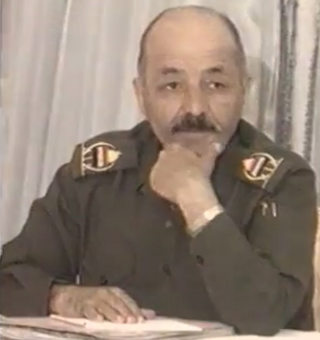
Taha Yasin Ramadan al-Jizrawi was an Iraqi politician and militia commander, who served as one of the three vice presidents of Iraq from March 1991 to the fall of Saddam Hussein in April 2003.
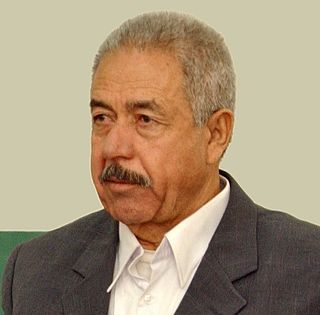
Ali Hassan Majid al-Tikriti, nicknamed Chemical Ali, was an Iraqi military officer and politician under Saddam Hussein who served as defence minister, interior minister, and chief of the Iraqi Intelligence Service. He was also the governor of Kuwait during much of the 1990–91 Gulf War.
Sabawi Ibrahim al-Tikriti, half-brother of Saddam Hussein, was the leader of the Iraqi secret service, the Mukhabarat, at the time of the 1991 Gulf War. He was the head of the Directorate of General Security from 1991 to 1996, and later served as a presidential advisor to Hussein.

Watban Ibrahim al-Nasiri was an Iraqi politician and former Interior Minister of Iraq. He was the half-brother of Saddam Hussein and the brother of Barzan al-Tikriti. He was taken into coalition custody 13 April 2003, following his capture as he tried fleeing to Syria. He died in prison of natural causes in 2015.
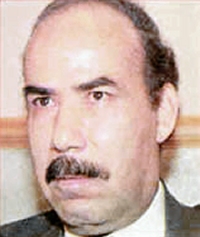
Barzan Ibrahim Hassan al-Tikriti, also known as Barazan Ibrahim al-Tikriti, Barasan Ibrahem Alhassen and Barzan Hassan, was one of three half-brothers of Saddam Hussein, and a leader of the Mukhabarat, the Iraqi intelligence service. Despite falling out of favour with Saddam at one time, he was believed to have been a close presidential adviser at the time of his capture by U.S. forces in 2003. On 15 January 2007, Barzan was hanged for crimes against humanity. He was decapitated by the hangman's rope after errors were made calculating his body weight and length of drop from the platform.
The Iraqi High Tribunal (IHT), formerly the Iraqi Special Tribunal and sometimes referred to as the Supreme Iraqi Criminal Tribunal, is a body established under Iraqi national law to try Iraqi nationals or residents accused of genocide, crimes against humanity, war crimes or other serious crimes committed between 1968 and 2003. It organized the trial of Saddam Hussein and other members of his Ba'ath Party regime.

Lieutenant General Abid Al-Hamid Mahmud al-Tikriti was an Iraqi military officer and Saddam Hussein's personal secretary.
The Iraqi Intelligence Service also known as the Mukhabarat, General Intelligence Directorate, or Party Intelligence, was an 8,000-man agency and the main state intelligence organization in Iraq under Saddam Hussein. The IIS was primarily concerned with international intelligence collection and analysis but also performed many activities inside Iraq in conjunction with the Directorate of General Security as a secret police organization.

The trial of Saddam Hussein was the trial of the deposed President of Iraq Saddam Hussein by the Iraqi Interim Government for crimes against humanity during his time in office.

Awad Hamad al-Bandar (Arabic: عواد حمد البندر السعدون, romanized: ʿAwād Ḥamad al-Bandar al-Saʿdūn; was an Iraqi chief judge under Saddam Hussein's presidency. He was a member of the Arab Socialist Ba'ath Party and was the head of the Revolutionary Court which issued death sentences against 143 Dujail residents, in the aftermath of the failed assassination attempt on the president on 8 July 1982.
Saadoun Antar al-Janabi was an Iraqi defence attorney during the Saddam Hussein Trials, and was one of two lawyers representing Awad Hamed al-Bandar. He was the head of defense team in the trial.
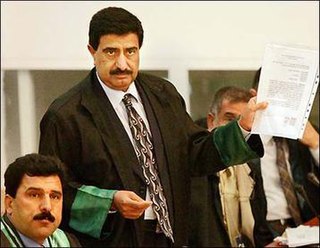
Khamis al-Obeidi was a lawyer defending Saddam Hussein and Barzan Ibrahim al-Tikriti, from the time the former leader's trial began in Baghdad on October 19, 2005, until his assassination. He was a Sunni Muslim, was married and had three children.
Capital punishment in Iraq is a legal penalty. It was commonly used by the government of Saddam Hussein, was temporarily halted after the US-led 2003 invasion of Iraq that deposed Hussein, and has since been reinstated. Executions are carried out by hanging.
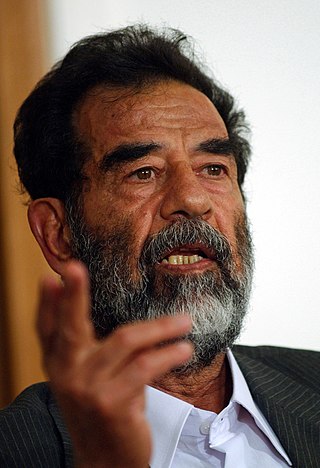
The execution of former Iraqi president Saddam Hussein took place on 30 December 2006. Saddam was sentenced to death by hanging, after being convicted of crimes against humanity by the Iraqi Special Tribunal for the Dujail massacre—the killing of 148 Iraqi Shi'ites in the town of Dujail—in 1982, in retaliation for an assassination attempt against him.
The Dujail massacre was a mass killing of Shiite rebels by the Ba'athist Iraqi government on 8 July 1982 in Dujail, Iraq. The massacre was committed in retaliation to an earlier assassination attempt by the Iranian-backed Islamic Dawa Party against the then President of Iraq, Saddam Hussein. The town of Dujail had a large Shia population, with 75,000 residents at the time of the incident, and was a well-known stronghold of the Dawa Party. It is located approximately 53 km (33 mi) from the capital of Baghdad, in the Sunni-majority Saladin Governorate of Iraq.

House of Saddam is a 2008 British docudrama television miniseries that charted the rise and fall of Saddam Hussein. A co-production between BBC Television and HBO Films, the series was first broadcast on BBC Two in four parts between 30 July and 20 August 2008.
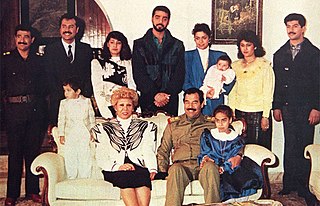
The Tulfah family was the family of Saddam Hussein of Ba'athist Iraq who ruled from 1979 to 2003 and established a single party authoritarian government under the control of the Ba'ath Party until the 2003 invasion of Iraq.

Reactions to the execution of Saddam Hussein were varied. Some strongly supported the execution, particularly those personally affected by Saddam's actions as leader. Some of these victims wished to see him brought to trial for his other actions, alleged to have resulted in a much greater number of deaths than those for which he was convicted. Some believed the execution would boost morale in Iraq, while others feared it would incite further violence. Many in the international community supported Saddam being brought to justice but objected in particular to the use of capital punishment. Saddam's supporters condemned the action as unjust.